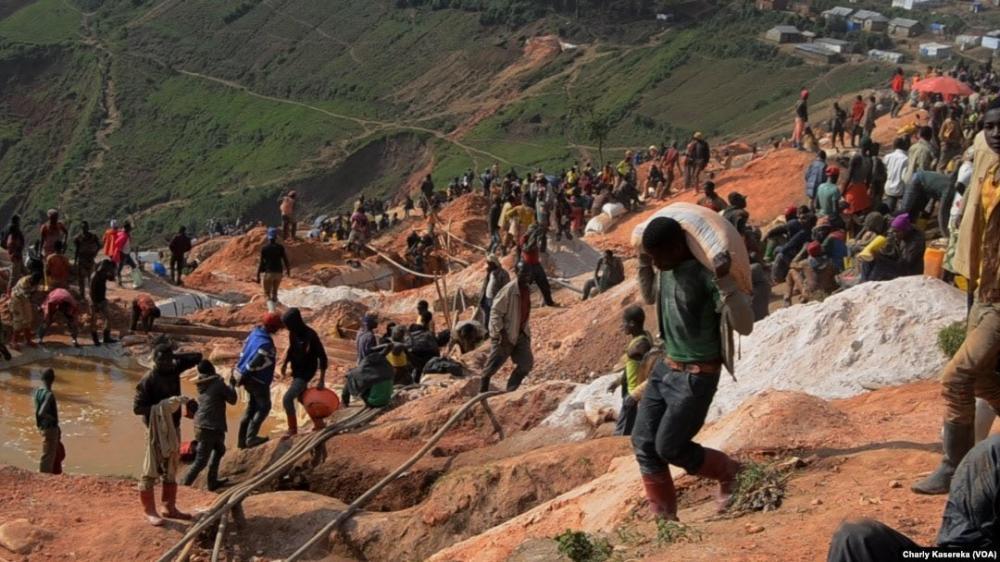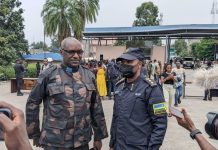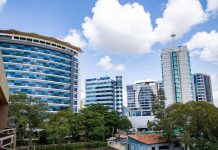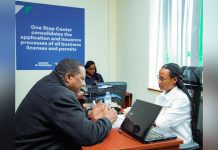Africa-Press – Rwanda. The route between Rubaya in eastern DR Congo’s North Kivu Province and Rwanda which is alleged to be used to supply coltan minerals to tech giant Apple does not exist and cannot supply the global market, according to Teddy Mazina, a photojournalist who has been to the region.
The Rubaya mines, also known as the Bibatama Mining Concession, are a series of coltan mining sites near the town of Rubaya in Masisi territory, North Kivu.
Last year, DR Congo accused Apple’s subsidiaries in France and Belgium of using “conflict minerals” in their supply chains, which they illegally mined in Rubaya and smuggled through Rwanda. Apple and Rwanda denied the allegations. Recently, President Paul Kagame reiterated that Rwanda’s problem has always been the security threats springing from neighbouring DR Congo, not minerals.
Kinshasa has claimed that Rwanda’s mineral imports are “stolen” from DR Congo, a false and dangerous narrative that has been accepted and spread by Western countries.
Mazina travelled to eastern DR Congo to check whether the “Rubaya route” exists and if it could be considered “the global capital of coltan”.
Talking to The New Times, he said that the journey from Goma, the capital of North Kivu, to Rubaya takes approximately five hours under good circumstances and from Rubaya to the actual mines it takes about 40 minutes on a motorcycle.
From a video shared on X, the road used to commute appears to be a rugged, muddy, and waterlogged sections with deep puddles and uneven surfaces, indicating it is prone to becoming impassable during rainy conditions.
The presence of vehicles and people struggling on foot carrying goods suggests it is difficult to navigate, especially for large-scale commercial transport.
Teddy Mazina, a photojournalist in Rubaya in Masisi eastern DR Congo
Mazina said that from his interactions with residents, having this road is normal as it provides market access and facilitates trade amongst themselves, though, due to its poor condition, they struggle to move and sometimes find themselves stuck for the night when their vehicles break down.
“There is no route of Coltan between Rubaya and Rwanda, it is only a road that facilitates trade. The artisanal mines of Rubaya cannot supply the global market of smartphones,” he noted.
He also said that the population in Rubaya is all Rwandophones.
According to him, the journey made so far “contradicts the theory that Rwanda would plunder the so-called strategic mineral and destabilize DR Congo because of the Rubaya mine, by passing through this route.”
The security crisis in eastern DR Congo has seen Western countries divert the issue to minerals, scapegoating Rwanda so as to protect their companies’ interests in the region, rather than addressing the root causes of the conflict. The Congolese government commits atrocities against Kinyarwanda-speaking Congolese and also wants to destabilize Rwanda.
Mazina said that the second part of his story, yet to be released, will include interviews with different mine workers, exploring trenches abandoned by Burundian troops in eastern DR Congo, and share the untold story of scandal in Muzenze central prison, among others.
Coltan is one of the most sought-after minerals around the world due to its critical role in the production of computers and other electronics that are driving the information age. When refined, two important minerals – tantalum and niobium, are extracted from coltan. Tantalum, is an essential component in capacitors that regulate the flow of electricity in tiny circuit boards found in devices like computers and smartphones, while niobium is used in oil and gas pipelines, beams and girders for buildings and oil rigs, welding, electronics, optics, and so on.
For More News And Analysis About Rwanda Follow Africa-Press






